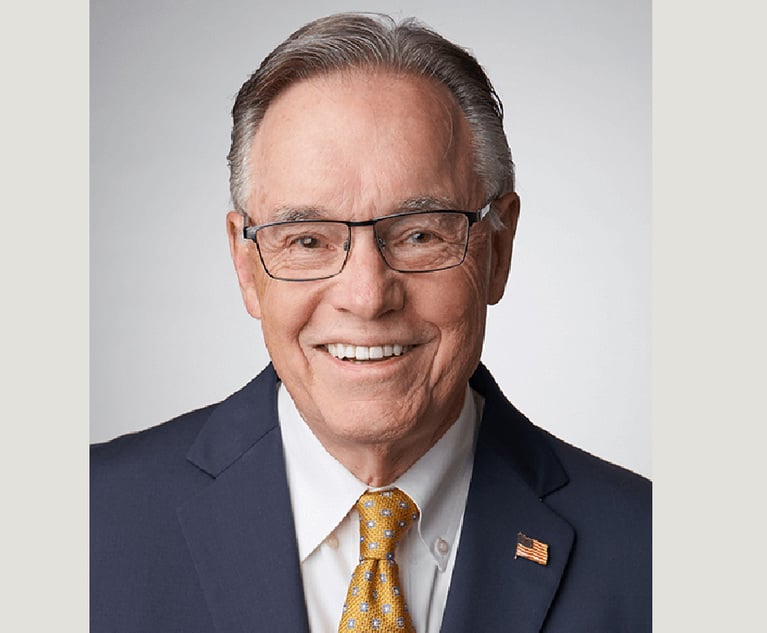 Shari Klevens (left) and Alanna G. Clair, Dentons US
Shari Klevens (left) and Alanna G. Clair, Dentons USThree Tips for Addressing Harassment and Discrimination in Law Firms
When it comes to the work environment, law firms cannot afford to live in the past by maintaining unwritten rules that deprive attorneys of equal opportunities within the firm.
November 06, 2017 at 09:49 AM
6 minute read
As the national headlines in recent weeks make clear, no industry is free from allegations of sexual harassment and discrimination. In the legal field, a number of recent high-profile lawsuits have alleged discrimination by law firms regarding attorney compensation and promotions.
The American Bar Association took action last year by adopting Rule 8.4(g) of the Model Rules of Professional Conduct. Rule 8.4(g) provides that it is professional misconduct for a lawyer to “engage in conduct that the lawyer knows or reasonably should know is harassment or discrimination on the basis of race, sex, religion, national origin, ethnicity, disability, age, sexual orientation, gender identity, marital status or socioeconomic status in conduct related to the practice of law.”
The rule also states that “it does not limit the ability of a lawyer to accept, decline or withdraw from a representation in accordance with Rule 1.16,” nor should it “preclude legitimate advice or advocacy consistent with [the Rules of Professional Conduct].”
To some observers, the adoption of Rule 8.4(g) is a welcome step that aligns the Model Rules with the Rules of Professional Conduct in those states that already address discrimination and harassment in the practice of law. However, others have opposed Rule 8.4(g) based on a variety of concerns. For example, shortly after the adoption of Rule 8.4(g), the Texas attorney general issued an opinion concluding that Rule 8.4(g) is unconstitutional because it would infringe on attorneys' free speech rights, among other reasons.
To date, the Georgia Rules of Professional Conduct have not been amended to include Rule 8.4(g), nor do they otherwise include a provision specifically addressing harassment and discrimination. But, of course, civil liability could still attach. Regardless of whether states ultimately choose to adopt Rule 8.4(g) (or some form of the rule), Georgia attorneys can still take steps to proactively address the risks of discrimination and harassment.
Shape the Culture
Some firms have been successful in creating a culture where it is clear that discrimination and harassment are not tolerated. In other circumstances, firm culture can be a silent contributor to facilitate discrimination and harassment. Indeed, the prevailing attitude of attorneys in a firm can contribute to whether attorneys feel comfortable reporting harassment or discrimination or whether their reports are demonized.
This is not to say that discrimination or harassment only occurs at those firms that tolerate it. Even the most supportive environments can have bad actors. However, the environs in a firm may help shape whether such conduct is openly reported or discouraged.
One important step in developing a positive firm culture is to establish mentoring programs for younger attorneys—whether official or unofficial. This can help create a culture of support at the firm and can allow the firm to identify and address potential instances of harassment or discrimination. It also sends the message that harassment is unacceptable, regardless of how high on the totem pole the harasser sits.
A strong mentoring program can also help guide younger attorneys regarding what is and is not appropriate behavior. This is especially important, given that attorneys new to the practice of law may have different understandings regarding what is acceptable conduct in a workplace environment.
Manage Risks at Firm Events
Law firm social events can be a great way to build camaraderie and to reward attorneys and staff for their hard work. However, some social events can be ripe for harassment or other inappropriate behavior.
To minimize these risks, law firms can choose to hold parties during the afternoon or at a public venue that may be less likely to lead to wild conduct. Colleagues can also hold each other accountable and intervene in situations where someone's behavior appears to be getting out of control.
The key is to proactively address any problems that may come to the firm's attention.
Adjust to Modern Norms
Although some circumstances warrant altering or monitoring behavior to prevent potential harassment, this can be taken too far. The practice of law is often accused of lagging behind other industries in many ways, such as the legal industry's reluctance to adopt new technologies. However, when it comes to the work environment, law firms cannot afford to live in the past by maintaining unwritten rules that deprive attorneys of equal opportunities within the firm.
For example, one vestige of the past is the practice of some male attorneys who are concerned about the appearance of impropriety when alone in a professional or social setting with any woman other than their wives. This practice has received renewed attention in recent months, known to some as the “Mike Pence Rule.” This practice has evolved, in part, because some men and women who work together find themselves on the receiving end of baseless rumors. In response, some senior male attorneys in law firms might avoid traveling, attending social events or holding closed-door meetings with their female colleagues and likely would also decline to act as a mentor for a younger female attorney.
Although the issue is one apparently grounded in attorneys' concerns about reputation, the problems with this rule in the workplace are obvious (and numerous). For example, a male senior attorney who refuses to travel to meet clients with a female colleague arguably deprives that colleague of important career opportunities based on her sex. Some of the most important components of an attorney's development from junior associate to senior partner come from mentoring and sponsorship opportunities. A lack of those opportunities is a significant impediment to the success of an attorney in the workplace.
For a profession that has struggled to reach parity of men and women at the partner level, this disparate treatment of female attorneys in particular extends the impact of past discrimination and deprives new generations of opportunities based on outdated notions.
By being mindful of and responsive to potential issues of discrimination or harassment, law firms can facilitate a culture of support and propriety.
Shari L. Klevens is a partner at Dentons US in Atlanta and Washington and serves on the firm's U.S. board of directors. She represents and advises lawyers and insurers on complex claims and is co-chair of Dentons' global insurance sector team. Alanna Clair is a senior managing associate at Dentons US in Washington and focuses on professional liability defense. Shari and Alanna are co-authors of “The Lawyer's Handbook: Ethics Compliance and Claim Avoidance.”
This content has been archived. It is available through our partners, LexisNexis® and Bloomberg Law.
To view this content, please continue to their sites.
Not a Lexis Subscriber?
Subscribe Now
Not a Bloomberg Law Subscriber?
Subscribe Now
NOT FOR REPRINT
© 2024 ALM Global, LLC, All Rights Reserved. Request academic re-use from www.copyright.com. All other uses, submit a request to [email protected]. For more information visit Asset & Logo Licensing.
You Might Like
View All


Business Breakups: Why Business and Commercial Cases Are Well-Suited to Mediation
5 minute readTrending Stories
- 1Judicial Ethics Opinion 24-89
- 2It's Time To Limit Non-Competes
- 3Jimmy Carter’s 1974 Law Day Speech: A Call for Lawyers to Do the Public Good
- 4Second Circuit Upholds $5M Judgment Against Trump in E. Jean Carroll Case
- 5Clifford Chance Hikes Partner Pay as UK Firms Fight to Stay Competitive on Compensation
Who Got The Work
Michael G. Bongiorno, Andrew Scott Dulberg and Elizabeth E. Driscoll from Wilmer Cutler Pickering Hale and Dorr have stepped in to represent Symbotic Inc., an A.I.-enabled technology platform that focuses on increasing supply chain efficiency, and other defendants in a pending shareholder derivative lawsuit. The case, filed Oct. 2 in Massachusetts District Court by the Brown Law Firm on behalf of Stephen Austen, accuses certain officers and directors of misleading investors in regard to Symbotic's potential for margin growth by failing to disclose that the company was not equipped to timely deploy its systems or manage expenses through project delays. The case, assigned to U.S. District Judge Nathaniel M. Gorton, is 1:24-cv-12522, Austen v. Cohen et al.
Who Got The Work
Edmund Polubinski and Marie Killmond of Davis Polk & Wardwell have entered appearances for data platform software development company MongoDB and other defendants in a pending shareholder derivative lawsuit. The action, filed Oct. 7 in New York Southern District Court by the Brown Law Firm, accuses the company's directors and/or officers of falsely expressing confidence in the company’s restructuring of its sales incentive plan and downplaying the severity of decreases in its upfront commitments. The case is 1:24-cv-07594, Roy v. Ittycheria et al.
Who Got The Work
Amy O. Bruchs and Kurt F. Ellison of Michael Best & Friedrich have entered appearances for Epic Systems Corp. in a pending employment discrimination lawsuit. The suit was filed Sept. 7 in Wisconsin Western District Court by Levine Eisberner LLC and Siri & Glimstad on behalf of a project manager who claims that he was wrongfully terminated after applying for a religious exemption to the defendant's COVID-19 vaccine mandate. The case, assigned to U.S. Magistrate Judge Anita Marie Boor, is 3:24-cv-00630, Secker, Nathan v. Epic Systems Corporation.
Who Got The Work
David X. Sullivan, Thomas J. Finn and Gregory A. Hall from McCarter & English have entered appearances for Sunrun Installation Services in a pending civil rights lawsuit. The complaint was filed Sept. 4 in Connecticut District Court by attorney Robert M. Berke on behalf of former employee George Edward Steins, who was arrested and charged with employing an unregistered home improvement salesperson. The complaint alleges that had Sunrun informed the Connecticut Department of Consumer Protection that the plaintiff's employment had ended in 2017 and that he no longer held Sunrun's home improvement contractor license, he would not have been hit with charges, which were dismissed in May 2024. The case, assigned to U.S. District Judge Jeffrey A. Meyer, is 3:24-cv-01423, Steins v. Sunrun, Inc. et al.
Who Got The Work
Greenberg Traurig shareholder Joshua L. Raskin has entered an appearance for boohoo.com UK Ltd. in a pending patent infringement lawsuit. The suit, filed Sept. 3 in Texas Eastern District Court by Rozier Hardt McDonough on behalf of Alto Dynamics, asserts five patents related to an online shopping platform. The case, assigned to U.S. District Judge Rodney Gilstrap, is 2:24-cv-00719, Alto Dynamics, LLC v. boohoo.com UK Limited.
Featured Firms
Law Offices of Gary Martin Hays & Associates, P.C.
(470) 294-1674
Law Offices of Mark E. Salomone
(857) 444-6468
Smith & Hassler
(713) 739-1250






